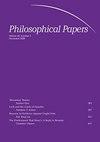Revisiting Eze on Ubuntu: Interrogating the Priority of the Political Over the Philosophical
IF 1.3
3区 哲学
0 PHILOSOPHY
引用次数: 1
Abstract
Introduction Emmanuel Chukwudi Eze’s insightful critique of ubuntu, first expressed in his paper ‘Between History and the Gods: Reason, Morality, and Politics in Today’s Africa’ and in his book On Reason: Rationality in a World of Cultural Conflict and Racism (Eze 2008a, 2008b) shows the theoretical shortcomings of ubuntu as a philosophical tool that may inform how philosophy reflects on the political. Eze argues that ubuntu as an extraordinary moral framework, may be ill-suited to capture ordinary experiences and subsequently pass appropriate judgement. Further, Eze asserts that to protect philosophy from unphilosophical encroachments, such as politics, we need to maintain a strict distinction between politics and the moral and philosophy. Such a distinction, in his view, would enable philosophy to turn itself into good philosophy that is free of ideological influences and commitments. In order for philosophy to do its philosophical tasks well, it has to stand up for and defend a specific form of reason that Eze identifies as ordinary reason. What I seek to do is to reaffirm Eze’s arguments, against ubuntu, in the three main sections that this paper is divided into. The first section will重新审视乌班图上的埃兹:对政治优先于哲学的质疑
引言Emmanuel Chukwudi Eze对乌班图的深刻批判,首次发表在他的论文《历史与众神之间:理性、道德,以及《论理性:文化冲突和种族主义世界中的理性》(Eze 2008a,2008b)一书中,展示了乌班图作为一种哲学工具的理论缺陷,它可能会为哲学如何反思政治提供信息。埃兹认为,ubuntu作为一个非凡的道德框架,可能不适合捕捉普通的经历并随后做出适当的判断。此外,埃兹断言,为了保护哲学免受非哲学的侵犯,例如政治,我们需要在政治与道德和哲学之间保持严格的区别。在他看来,这种区别将使哲学成为一种没有意识形态影响和承诺的好哲学。为了让哲学做好它的哲学任务,它必须捍卫和捍卫一种特定形式的理性,埃兹认为这种理性是普通的理性。我想做的是在本文分为三个主要部分,重申埃兹反对乌班图的论点。第一部分将
本文章由计算机程序翻译,如有差异,请以英文原文为准。
求助全文
约1分钟内获得全文
求助全文
来源期刊

Philosophical Papers
PHILOSOPHY-
CiteScore
2.10
自引率
0.00%
发文量
18
期刊介绍:
Philosophical Papers is an international, generalist journal of philosophy edited in South Africa Original Articles: Articles appearing in regular issues are original, high-quality, and stand-alone, and are written for the general professional philosopher. Submissions are welcome in any area of philosophy and undergo a process of peer review based on initial editor screening and refereeing by (usually) two referees. Special Issues: Topic-based special issues are comprised of both invited and submitted papers selected by guest editors. Recent special issues have included ''Philosophy''s Therapeutic Potential'' (2014, editor Dylan Futter); ''Aging and the Elderly'' (2012, editors Tom Martin and Samantha Vice); ''The Problem of the Criterion'' (2011, editor Mark Nelson); ''Retributive Emotions'' (2010, editor Lucy Allais); ‘Rape and its Meaning/s’ (2009, editor Louise du Toit). Calls for papers for upcoming special issues can be found here. Ideas for future special issues are welcome.
 求助内容:
求助内容: 应助结果提醒方式:
应助结果提醒方式:


